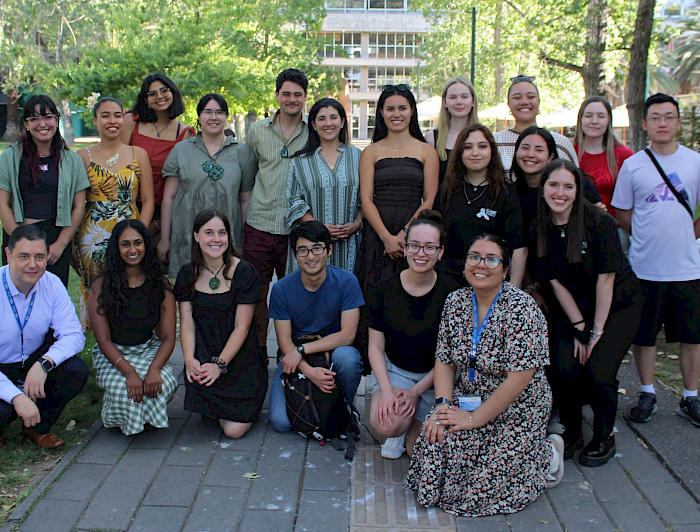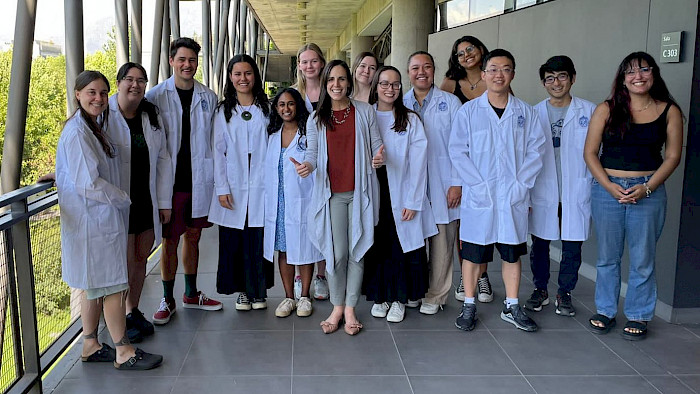How Does the Intercultural Approaches for Public Health Program Works?
03 April 2024
Through a combination of workshops, seminars, practical sessions, and immersive field experiences, this program aims to provide international students with stronger intercultural skills in public health.

The UC Chile Office of the Vice President for International Affairs and the UC School of Nursing joined forces to host the second iteration of the Intercultural Approaches for Public Health program in January.
This time 13 international students from the University of Auckland (New Zealand), Middlebury College (USA), and The University of Sydney (Australia) participated in academic activities exploring the Chilean healthcare system.
During the program, students attended seminars on public health and interculturality, visited clinical sites within the UC-Christus Healthcare Network in Santiago of Chile, and engaged in cultural activities to learn more about Chile through its art, culture, and history.
Two students from the UC School of Nursing, selected for outstanding performance, also joined the foreign participants.
Intercultural Learning
The program offers conceptual and empirical elements of social sciences to contextualize health processes within complex sociocultural environments, identify public health challenges in the region, and promote the development of global competencies to address these challenges.
Traditional Mapuche's and Aymara's medicine and worldviews are also explored in the program to provide participants with the opportunity to examine the interactions between globalization processes and local identities and how these align within healthcare systems.
"We want undergraduate and master's students from any field participating in this initiative to identify public health challenges in Chile and Latin America and relate them to issues in their own countries, fostering a critical understanding of the intersections between sociocultural, historical, and territorial influences, and community health needs through seminars, workshops, field trips, and cultural experiences," said Cristián Bonilla, Head of Study Abroad & International Internships at the UC Chile Office of Global Mobility.
The first cultural activity took place during the student welcome, where Moana Tepano, a UC College student and member of Haka Nonoga and native of Rapa Nui, made a presentation about Easter Island, its language, traditions, and dances. Her presentation held a special connection for the students from Oceania due to their Polynesian roots.
Another part of the program included visits to UC Christus clinical campuses like the UC Clinical Hospital and the San Joaquin Medical Center. The visit continued to the Ruka Choyituyiñ Warria Meu in the Macul municipality, where students participated in a seminar led by Machi Manuel Lincovil and his wife, Lawentuchefe María, that focused on the Mapuche worldview and its approach to health.

In addition to field trips,students participated in seminars on public health and interculturality and workshops on global competency development led by Maribel Flórez, Director of Global Learning; Felipe Herrera, Head of the Internationalization at Home program; and Roberto González, Director of the UC Interculturality Program.
Finally, cultural activities were organized for participants to learn more about Chile's history and institutions, including visits to La Moneda Palace, the Chilean Museum of Precolombian Art, the Museum of Memory and Human Rights, and a tour of the Valparaíso region and its famous hills known for having houses of various colors, stairs that help climb the hills and a wide coastal sector that runs through the cities of Viña del Mar and Valparaíso.
Reflecting on her experience in the program, Charlotte Tukiri from the University of Auckland praised the program's methodology and cultural focus: "This experience was a collection of lived experiences, opinions, ideas, and different ways of thinking that we will take home and implement in our lives. We appreciate UC Chile's effort to provide us with experiences beyond the classroom, allowing us to learn about the history and culture of their country. We will take a piece of Chile with us."
This program, originating from the Office of the Vice President for International Affairs, aims to encourage cultural exchange as a part of learning and promote the development of global competencies among international students and the UC Chile community. "Integrating the intercultural dimension into the learning process directly addresses the need to connect in an increasingly globalized society. Cultural exchange, comparative experience, and practice in different sociocultural environments enrich learning and enhance innovation. We will continue to promote programs with global impact and cultural responsibility," said Lilian Ferrer, UC Chile Vice President for International Affairs.
Thanks to the positive feedback from participants, another edition of the Intercultural Approaches for Public Health program is expected for the summer of 2025.




